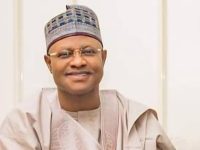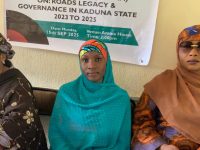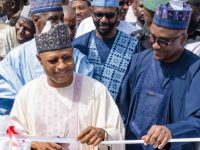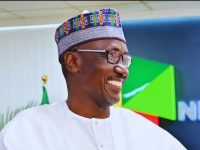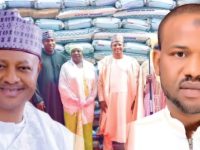Beyond the Milestone: Cardoso’s CBN Legacy

By Nasir Dambatta
Governor Olayemi Cardoso’s tenure at the Central Bank of Nigeria (CBN) has been defined by notable changes in the country’s financial landscape. In just one year, his leadership has initiated several reforms, aiming to place Nigeria on a more resilient economic path. From the outset, his focus on transparency, accountability, and reform has been central to his approach. Among his key moves was the increase in the capital base of Nigerian banks, an essential step toward safeguarding the sector and ensuring its ability to withstand economic challenges.
Strengthening the financial sector is not merely about boosting banks’ balance sheets; it’s about creating the conditions for sustained economic growth. Cardoso understood that a more stable banking system is critical for achieving macroeconomic stability. By increasing capital reserves, banks can better manage potential shocks, which, in turn, enhances their capacity to lend. Lending is vital for business growth, particularly for small and medium-sized enterprises (SMEs), which are the backbone of Nigeria’s economy. With more robust financial institutions, Nigeria can create an environment where innovation thrives, businesses grow, and jobs are created. Cardoso’s policies in this area have thus laid the groundwork for broader economic stability.
But Cardoso’s leadership does not stop at the banking sector. He has outlined a bold roadmap for economic growth, targeting a significant expansion of Nigeria’s GDP in the coming years. His vision includes reducing Nigeria’s historical reliance on oil revenues, a vulnerability that has often left the country at the mercy of global oil price fluctuations. Instead, he advocates for a diversified economy where sectors such as agriculture, manufacturing, and technology play a central role. This shift, although ambitious, is one that could transform Nigeria’s economic future. By encouraging investments in these non-oil sectors, Cardoso is positioning the country to be less dependent on oil while promoting more sustainable and resilient growth patterns.
Diversification is critical to Nigeria’s long-term economic success. For decades, the country has experienced economic volatility due to fluctuating oil prices, and despite its vast human and natural resources, its potential has often been curtailed by over-reliance on a single commodity. Under Cardoso’s leadership, the Central Bank has taken concrete steps to support non-oil sectors, providing financing mechanisms, incentives, and policies that encourage investment. The focus on agriculture, for instance, aligns with Nigeria’s rich agricultural history, offering opportunities to modernize farming practices, increase output, and create value chains that enhance job creation.
Cardoso’s attention to human capital development is another key pillar of his economic strategy. He recognizes that an educated and skilled workforce is essential for driving economic growth in the 21st century. Policies that prioritize education and vocational training are central to his vision, ensuring that Nigeria’s youth are equipped with the skills they need to compete in a globalized economy. By focusing on education, Cardoso is also addressing one of Nigeria’s most pressing challenges: youth unemployment. A well-trained workforce is not only more productive but also more capable of driving innovation and entrepreneurship, both of which are essential for Nigeria’s economic transformation.
In parallel, Governor Cardoso has emphasized the importance of infrastructure development as a foundation for sustained growth. Whether it’s in transportation, energy, or telecommunications, his policies aim to modernize Nigeria’s infrastructure, making it more efficient and capable of supporting an expanding economy. For instance, improved transportation networks will reduce the cost of doing business, enabling goods to move more freely and efficiently across the country. Similarly, investments in energy infrastructure will ensure more reliable electricity, a critical factor for the growth of industries and businesses.
A key focus of Governor Cardoso’s tenure has also been inflation targeting, a sophisticated approach that aims to maintain price stability. Inflation has long been a challenge in Nigeria, eroding purchasing power and creating uncertainty for both consumers and investors. By adopting global best practices in inflation management, Cardoso aims to create an environment where businesses can plan more effectively, knowing that price fluctuations will be minimized. This stability is crucial for fostering investment, both domestic and foreign, as investors seek predictable environments where their returns are not eroded by runaway inflation.
Maintaining the integrity of Nigeria’s financial system has also been a priority for Cardoso. His administration has enforced regular stress tests on banks to ensure their ability to withstand economic shocks. These tests are critical for assessing the resilience of the banking sector and for identifying potential vulnerabilities before they escalate into crises. Furthermore, Cardoso has not hesitated to impose sanctions on banks that fail to comply with regulatory standards, demonstrating a commitment to upholding the rule of law and maintaining a fair playing field within the financial sector. These actions reinforce the credibility of the Central Bank as a regulator, ensuring that Nigeria’s banking system remains robust.
The introduction of a unified exchange rate under Cardoso’s leadership has been another significant milestone. Previously, Nigeria’s multiple exchange rates created distortions in the economy, increasing uncertainty for businesses and investors. A unified exchange rate brings greater transparency and allows businesses to operate with more clarity. This policy is already showing signs of success, as it has improved investor confidence and positioned Nigeria as a more reliable market for international investors. By simplifying the exchange rate regime, Cardoso has reduced the inefficiencies that previously plagued Nigeria’s foreign exchange markets.
Governor Cardoso’s push for fiscal reforms, including the removal of petrol subsidies, marks another bold step in his tenure. While politically contentious, the removal of subsidies was necessary to free up government resources for more productive uses. Subsidies had long drained billions of naira from the treasury, limiting the government’s ability to invest in critical infrastructure and social programs. By removing these subsidies, Cardoso has opened the door for greater fiscal responsibility, enabling the government to redirect resources toward long-term investments that will benefit the broader economy.
Financial inclusion has been another key focus of Cardoso’s leadership at the CBN. Expanding access to financial services has long been a challenge in Nigeria, particularly in rural areas where traditional banking infrastructure is limited. Through initiatives such as mobile banking, agent banking, and financial literacy programs, Cardoso has worked to bring more Nigerians into the formal financial system. This expansion of financial inclusion is about more than just providing banking services; it’s about empowering individuals and communities with the tools they need to improve their economic standing. By ensuring that more Nigerians have access to financial services, Cardoso is laying the foundation for more inclusive economic growth.
His efforts have not gone unnoticed on the global stage. Under Cardoso’s leadership, Nigeria has strengthened its relationships with international financial institutions, enhancing the country’s credibility and boosting its attractiveness to foreign investors. These improved ties are critical in today’s interconnected global economy, where access to international capital and expertise can make all the difference in a country’s development trajectory. By fostering these relationships, Cardoso has positioned Nigeria as a more active participant in the global financial system, with increased leverage to attract the investments needed for its development.
In conclusion, Governor Olayemi Cardoso’s first year at the helm of the Central Bank of Nigeria has been a transformative period for the country’s economy. His leadership has brought about important changes, from strengthening the banking sector to promoting economic diversification and improving financial inclusion. As Nigeria continues its journey toward becoming a major player on the global economic stage, Cardoso’s vision and policies will undoubtedly play a central role in shaping the country’s future. While challenges remain, the foundation has been laid for Nigeria to achieve its ambitious economic goals, with the Central Bank playing a pivotal role in making that vision a reality.
Dambatta wrote from Kaduna


